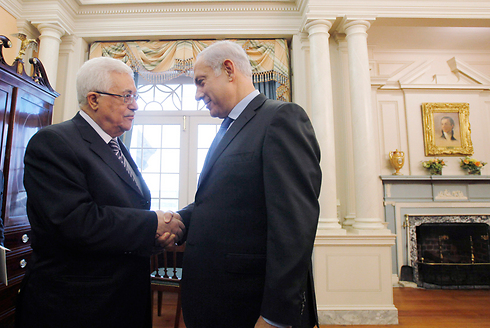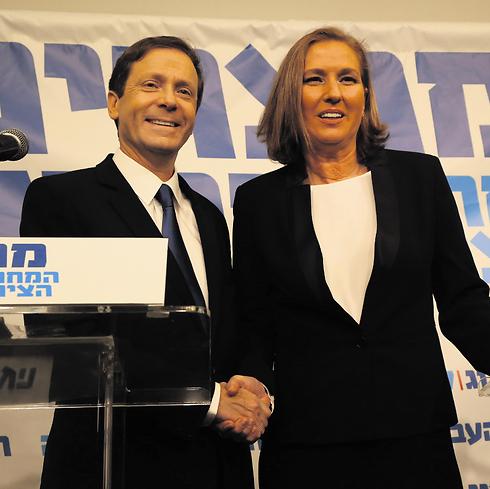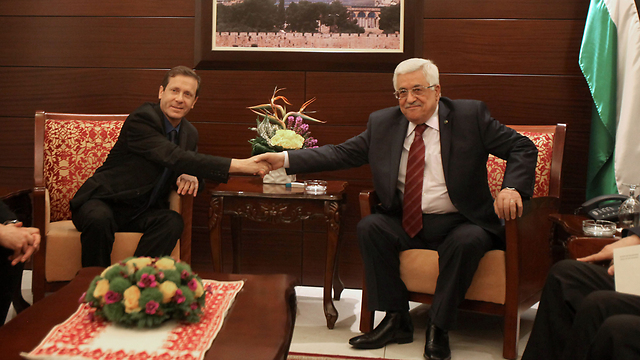
Palestinians hope for change but secretly root for Netanyahu
While many believe the Palestinian Authority wants Netanyahu out of power, some officials admit rightwing rule helps Palestinians portray Israel as an obstacle to peace; ‘even his Congress speech helps us,’ PA official says.
Palestinian leadership has repeatedly said the upcoming Israeli elections are an internal Israeli matter, but some are willing to admit that if anyone has a stake in the elections it’s them – and off the record some are even willing to go as far as saying they prefer a right wing government stay in power.
“Any decision reached by the Israeli people is their own. Any government formed in Israel will not lead to a change in our demands,” the official Palestinian policy goes, but talks with officials reveal a more nuanced position.
Political tensions between Israel and the Palestinian Authority could not be more severe. After nine months of US-led talks ended without results last April, the Palestinian Liberation Organization and the PA decided to take their struggle to the international stage and try to gain statehood through diplomatic efforts: Beginning with the an attempt to attain UN recognition and, most recently, by joining the International Criminal Court in The Hague.
Needless to say, Jerusalem is not pleased and thus the prospect of a center-left government led by Labor’s Isaac Herzog and former top peace negotiator Tzipi Livni should be music to Palestinian ears. However, opinions on the matter are split in Ramallah, with some hoping for Netanyahu’s fall and others for his continued rule.
“There are people who unequivocally hope for the Livni-Herzog camp to win. This is the camp (Palestinian President) Abbas is in because he thinks that if they win Israel will be willing to return to negotiations,” a senior Palestinian official told Ynet.
According to him there is also a rival camp: “This group claims that the opposite is the case. They think that if Livni and Herzog win and form the next Israeli government, then all of the Palestinians diplomatic efforts will be forced to grind to a halt because the world will no longer support (unilateral) steps which are now gaining steam, opting to send us back to the negotiation table.”
This school of thought maintains that a rightwing government led by Netanyahu and rightwing Bayit Yehudi leader Naftali Bennett is actually preferable for the Palestinians.
“Abbas is definitely not part of that school of thought,” another PA official close to Palestinian president stressed.
“He belongs to the camp which is in love with the idea of negotiations, but there are those who attribute great importance to the Palestinians' assent in international status, especially in tandem with a parallel drop in Israel’s standing. And even more when these occur as a result of Netanyahu and (Foreign Minister Avigdor) Lieberman’s polices,” the Ramallah official said.
“If indeed there is a decision to continue with this diplomatic path – it demands a rightwing government which knows how to lock horns with Obama and spit in the face of the international community,” he added.
The Palestinian official, who is a close associate of Abbas, notes there are other reasons to support the right as well – namely a reluctance to believe a center-left government will actually lead to the end of the conflict and the establishment of a Palestinian state, as was the case of the Israeli governments led by Ehud Barak and Ehud Olmert, both who also conducted unsuccessful negotiations with the Palestinians during their time in office.
“Tzipi Livni could also make things worse for the Palestinians because she gives Israel a more moderate face in the world, but on the other hand she will never lead a real negotiation with the Palestinian leadership,” the source said.
‘Netanyahu’s US speech helps the Palestinians’
The Palestinian official quoted in beginning of the report seemed to claim that Netanyahu was actually helping the Palestinian cause.
“Everything Netanyahu did and does today will at the end of the day serve Palestinian interests because almost every country in the world – except Canada – support the Palestinians. Even Netanyahu’s scheduled US Congress speech serves our interests because it creates a schism between the Israel and the White House," he said.
Other officials say Palestinians are quietly rooting for the fallout between Israel and the US to spill into the UN, with the optimists hoping the split will lead the US to choose not to exercise its veto powers to protect Israel in the Security Council when the time comes to vote (again) for an Arab-led resolution to end Israel’s control of the West Bank.
In this regard, officials say that the recent rift between Israel and the White House has gotten many in Ramallah thinking that a center-left wing government might not be in their interests.
The top source said that Palestinians are still interested in a holding peace talks – but not forever. “If the negotiation option will take 20 more years – then we prefer a Netanyahu government. But if you say that there are those willing to enter negotiations with the intent of reaching a deal and putting this historic saga to rest through a two-state solution – then we want that type of negotiations."
“Nonetheless, it is far from certain that Herzog and Livni will lead such a negotiation and actually want the conflict to end,” he said.
According to Ashraf al-Ajrami, a former top Palestinian politicians who now writes about Palestinian affairs, the Palestinians public is growing increasingly interested in the elections, though they attribute little to no significance to the actual results which they believe will not lead to a change on the ground.
“People talk about the elections, but they are not pinning their hopes on the Israeli elections, because most Palestinians do not really differentiate between the two political camps. They have seen how every Israeli government – left or right – did nothing as far as the conflict is concerned, and so they think nothing will change,” he said.
Al-Ajrami claims that the Palestinian public is still not sure if the new path of unilateral actions in the diplomatic arena is the best way to go. The main reason, he claims, is the economic sanctions Israel inflicts on the Palestinians as a result of every such step.
Al-Ajrami says that though a right wing government will increase Israel’s international isolation, it is a very slow and long process, too slow to offer the Palestinians the solutions they want.
“The Palestinian leadership will continue on its diplomatic path, but it is very likely this process will slow if a new government is formed in Israel and it will be willing to return to negotiations. Petitioning the UN will not solve the problem – only a cooperative diplomatic effort will yield results.”














